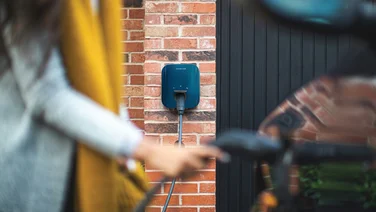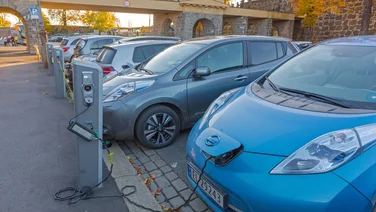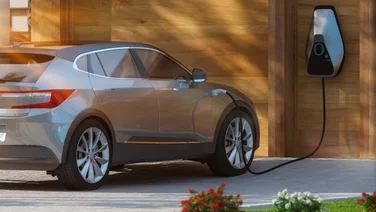- Salary sacrifice schemes are a tax-efficient way to purchase electric vehicles
- Like cycle-to-work schemes, they allow you to pay for an EV in installments
- The advantage is that you pay from your salary before tax
- Your employer needs to be part of a scheme for you to benefit

Zero emissions targets are making EVs more popular
With more than 1 million Electric Vehicles (EVs) now on UK roads, and manufacturers slashing prices to compete with each other, EV prices are coming down fast.
On top of the zero-emissions environmental benefits of making the switch to driving electric, the running cost of an EV is £528 per year cheaper to run than a petrol car, so there’s also an economic argument for swapping out the old gas-guzzler.
However, with an average cost of between £15,000 to £60,000 on the road – depending on vehicle size and specification – that’s a lot of money to find before you can drive off the showroom forecourt.
While there is no government funding to help subsidise this upfront cost, you should ask your employer if they offer an EV salary sacrifice scheme that will help you pay for your new EV.
In this guide, we dive into what an EV salary sacrifice scheme is, how it works and how it can benefit both employers and employees.
What is an EV salary sacrifice scheme?
An EV salary sacrifice scheme is an agreement between you and your employer to reduce your monthly salary in return for tax-free payments towards a new or used electric vehicle.
Similar to cycle-to-work schemes, an EV salary sacrifice scheme is an employee benefit. As an employee, you still have to pay for the car, but as your employer takes the monthly payment from your pay packet before tax (your gross pay), you can save up to 40% on the cost of the car – depending on your tax bracket.
In addition to this, because salary sacrifice schemes effectively reduce your salary, you also pay less in income tax and national insurance payments as a result. So, you pay less in income tax and NI contributions to HMRC and the Treasury, plus you save on the EV, and then save on the running costs of driving a zero-emissions vehicle.
By contrast, if you lease a car with your net salary (your take-home pay), you pay more in tax on top of your car payments.
For this reason, paying for your electric car through a salary sacrifice scheme works out significantly cheaper than any other route to ownership.
It’s worth noting that any salary sacrifice arrangement must not reduce your cash earnings below the National Minimum Wage, which as of April 2024, is £11.44 for those aged 21 and over.
An employer can change the terms of your contract to highlight the salary sacrifice scheme, but any and all changes must be agreed with you.
How do EV salary sacrifice schemes work?
An EV salary sacrifice scheme works when you lease an EV through your employer for a fixed period of time. The payments for the EV come straight out of your salary before tax and National Insurance are taken off, which means you won’t pay tax on the money you pay towards the lease.
This makes it better value than if you were to lease an EV independently, not through your employer.
As per the gov.uk website: “As a general rule, if an employee swaps between cash earnings and a non-cash benefit whenever they like, any expected tax and National Insurance contributions advantages under a salary sacrifice arrangement will not apply.”
There are some exceptions to this, outlined in the Employment Income Manual 42755.
Your contract will likely be changed to reflect the salary sacrifice scheme. The contract must be clear on what your cash entitlements are at any given time.
You should be able to change the terms of any EV salary sacrifice where a personal lifestyle change has altered your financial circumstances. These include:
- Changes to circumstances directly arising as a result of Covid-19
- Marriage
- Divorce
- Partner becoming redundant or pregnant
If you’re affected by any of these, salary sacrifice should allow for an opt in or out clause.
How do I get an EV salary sacrifice scheme started?
It’s ultimately down to the employer to set up a salary sacrifice scheme, but as an employee, you can express your interest.
If you are an employer looking to introduce an EV salary sacrifice scheme, here are the steps you need to take and consider.
Firstly, you need to find a reputable EV business.
Octopus EV, for example, offers such a scheme. According to their site, once you’ve given the go ahead, the process is simple.
Your business will go through a credit check to create a line of credit for your company, which would tell the provider how many cars you’ll be able to get through the scheme for your employees.
They’ll then work with your finance team to sort all the paperwork before a decision is made. A decision will take approximately a week, but this will differ from company to company.
The paperwork typically includes:
- An agreement between the salary sacrifice scheme company and your company
- A direct debit form
- A company sign-up form
Once you’ve set up an EV salary sacrifice scheme, you can create a list of vehicles they approve of, and then each month a part of your employee’s salary is automatically deducted.
However, employees will still need to pay the Benefit in Kind tax.

EV salary sacrifice scheme benefits for employers
If you’re an employer, offering an EV salary sacrifice scheme could definitely make you stand out from your competitors, especially as the job market becomes more competitive.
PodPoint says the key business benefits are:
- Attract new talent – Salary sacrifice, especially with the option to lease an electric car, could be a standout feature in the benefits package you advertise and offer.
- Increase employee retention – Boost satisfaction and increase loyalty among existing staff by offering an EV salary sacrifice scheme. It will help EVs be more affordable, while reducing taxable income – a win-win.
- Support your green values – Many businesses have their own environmental goals and commitments, and an EV salary sacrifice scheme offers a strong opportunity to help you achieve them.
- Save on National Insurance – The deduction made from an employee’s gross salary reduces National Insurance contributions for both yourself and employees.
EV salary sacrifice scheme benefits for employees
It’s not only employers that would benefit from an EV salary sacrifice.
As an employee:
- You’ll save money – It is easier to buy an EV and you could save up to 40%. There is also little to no upfront cost from your side as it will usually be deducted from your salary as part of your monthly payments.
- Reduce taxable income – As you’ll be sacrificing your salary, you’ll reduce your taxable income. What’s more, your insurance, road tax and maintenance will all be included in your monthly payments
- No credit check required – Your employer will undergo a credit check when setting up an EV salary sacrifice, therefore you won’t need to because the agreement is between you and your employer.
How is salary sacrifice different from a company car allowance?
A company car allowance means your employer will offer a salary bump that has to be put towards a new car. Employees are also required to source the car themselves, and are responsible for insurance and maintenance outside of this cost.
With most salary sacrifice schemes, however, you are covered for insurance and maintenance.
A company car allowance also means you won’t benefit from reduced tax income or national insurance contributions, like you would with an EV salary sacrifice scheme. In fact, you might pay more because of the ‘salary bump’.
The only significant benefit a company car allowance has over an EV salary sacrifice scheme is you don’t have to pay the Benefit in Kind tax.
If you’re an employer offering a company car allowance, consider offering a salary sacrifice scheme alongside this.
Are EV salary sacrifice schemes worth it?
Absolutely. For an employee it’s win-win.
If you are an employer, talk to your employees first to gauge interest before you launch into the credit checks and paperwork needed to set one up.
Ask your employees whether they’ve ever thought about buying an EV and if they would be interested in getting one.
From here, you can research the right company for you to partner with and start the process.

Which companies offer EV salary sacrifice schemes?
More and more companies are offering EV salary sacrifice schemes, but here’s a list to get you started:
- Octopus EV – Offers the EV, an EV home charger, public charger network credit (up to 4000 free miles), insurance, servicing, maintenance, tyres and breakdown cover.
- Tusker – Tusker is a carbon neutral company that provides both company car and salary sacrifice schemes to UK organisations in both the public and private sectors.
- The Electric Car Scheme – The scheme is to help people make a greener choice. The company works with a wide range of car leases companies to find the best value lease on the market for each car.
- Elmo – Clients can access all the usual benefits of an EV salary sacrifice, but unlike a traditional lease, there’s no deposit, multi-year contract and no early termination liability and the subscription package is all inclusive.
- Fleet Alliance – The company offers solutions for fleets of all sizes, and claim to work closely with employers to deliver a cost-effective scheme that is easy to manage.
- Fleet Electric – This scheme enables employees to lease a brand new fully maintained and insured EV cheaper than they could obtain themselves.
- Love Electric – This scheme operates in the same way as the bike-to-work scheme, typically saving 50% of annual motor costs through income tax and national insurance savings.
Summary
- An employer can change the terms of your contract to highlight the salary sacrifice scheme, but any and all changes must be agreed with yourself
- An employer can change the terms of your contract to highlight the salary sacrifice scheme, but any and all changes must be agreed with yourself
- It is easier to buy an EV and you could possibly save up to 40%.
- Before you launch one and run all sorts of credit checks, talk to your employees first to gauge interest
- More and more companies are offering EV salary sacrifice schemes






